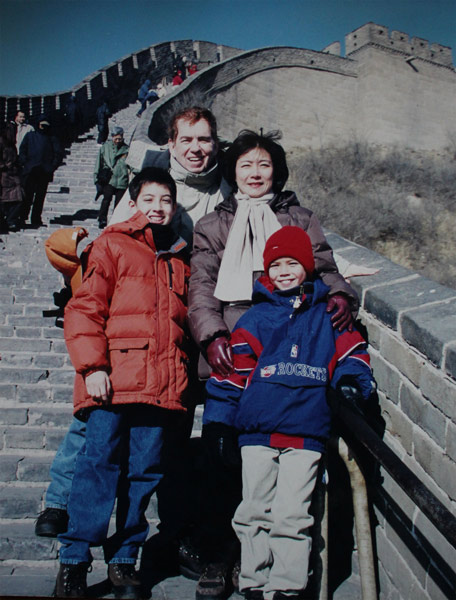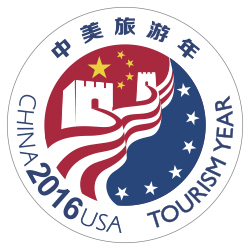The Fosters: Learning China by going, again and again
By MAY ZHOU in Houston (chinadaily.com.cn) Updated: 2016-04-08 10:11 |
|
Lily and Charles Foster take their children to visit the Great Wall in 2000 to celebrate the new millennium. PROVIDED TO CHINA DAILY |
Charles Foster, who has travelled to China extensively, still vividly remembers his first trip there in 1979.
"I was very curious about China at that time," he said. "I remember I was playing magician in the streets of Beijing - I had a Polaroid camera and took photos of people and they were amazed to see their images gradually appear before their eyes."
Little did he know at that time that 10 years later he would marry Chinese actress Chen Ye, now known as Lily Chen Foster, who became famous with her leading roles in big-budget movies like The Burning of Yuanmingyuan and Reign Behind a Curtain. They have two sons and have made many trips to China.
They just travelled to Shanghai, Lily Foster's home town, in March, and the contrast was dramatic.

"We stayed in the Pudong section," said Foster. "The new zone is filled with modern buildings. The shopping malls and streets are full of global name brands. I felt I was in the Galleria, not Shanghai," she added, referring to Houston's largest mall.
"I felt like a foreigner in Shanghai. Where I grew up, the buildings, the trees, they were all gone. Every time when I saw something familiar, I would become excited and emotional because it brought back memories of my childhood,"she said.
While she does not entirely embrace the transformation that has occurred in her home town, her husband sees it as a sign of progress.
"I understand Lily's desire to go back to something authentically Chinese, but it tells us that China is very prosperous," he said. "There is a lot of ultra-modern architecture in Western style. To me it shows China's certain acceptance and openness to the West.
"It's a positive thing,"added Foster, a lawyer who served aschairman of the Asia Society Texas Center for two decades and is currently chairman of US-China Partnerships.
The Fosters took their first joint trip to China in the early 1990s. "I took him to the Forbidden City and showed him the throne where I once sat to film the movies. I spent eight months in the Forbidden City playing the empresses. To me it was like going home," she said.
They also went on an excursion organized by the Asia Society. Along with diplomats and political and business leaders from China and other countries, they rode on a boat from Chongging to Wuhan to see the Yangtze River and Three Gorges before the dam went up.
During that trip Charles Foster learned a valuable lesson from his actress wife who always told him that being from Shanghai was so important.
"It was arranged to rotate seating every night for people to get to know each other," he said. "The first night a powerful Philippine businessman named Washington Sycip, in learning that Lily was from Shanghai, said: I am a Shanghainese too, in dialect. His family was originally from Shanghai, and I thought that was quite cool."
The second night the Fosters were seated with then deputy premier of Singapore Lee Hsien Loong and his wife. He also said to Lily: I am a Shanghainese too, in dialect.
The third night, the third night Charles Foster felt he was safe as they were going to be seated with non-Asians that night, but Michael Blumenthal, who served as Secretary of the Treasury under President Jimmy Carter, said to Lily: "I am a Shanghainese too," in dialect.
Blumenthal had lived for eight years in Shanghai as a Jewish refugee during WWII.
"It's unreal that all these important people from different countries in their hearts were Shanghainese," Foster said. "I was convinced: Shanghai is big and important."
Another fun story from the Fosters' numerous China trips involves Deng Xiaoping's famous cowboy hat.
About three years ago, the Fosters visited the National Museum of China on Tiananmen Square, where they found on display the 10-gallon Stetson cowboy hat worn by Deng Xiaoping during his historical visit to Houston in 1979.
"When Deng, coming out on a western stage-coach, put on the 10-gallon Stetson cowboy hat, I was less than 10 feet away from him witnessing history unfolding. In the glass case at the museum, Deng's cowboy hat lay there with top being carefully flattened. I was shocked - they didn't know what cowboy hat should look like and its unique style was lost. History was lost," said Charles Foster.
He made an effort talking to various people about the shallow creaseson the top as the right style of a cowboy hat. Eventually, prominent businessman Ronnie Chan, also chairman of Asia Society in Hong Kong, said he has connection to the museum to pass along the message.
"Last year, we spent half a day waiting in line and visiting the museum so he could check out how the cowboy hat looked like," said Lily Foster.
"I was glad to see that the cow-boy hat in the museum got the right style now," said Charles Foster with certain satisfaction.
Of their many trips to China, one place stands out for Charles Foster as his favorite spot - Tiananmen Square.
"Standing on the square, you are surrounded by the museums, the People's Congress, the Mausoleum of Mao Zedong and the Forbidden City. There is such a concentration of power, culture and history at that one spot," he said.
On another visit they bought tickets to climb up to the Tiananmen Rostrum and stood where Mao Zedong once stood.
"I was so emotional with mixed feelings I almost cried," said Lily Foster.
For her, visiting China went beyond sightseeing or business. She took her sons to live in a simple cement block building one summer and enrolled them in local school programs. They spoke Chinese and played with Chinese kids.
"We wanted them to experience everyday Chinese life and culture," she said.
This May, the first World Tourism Development Conference will be held in China.
"I think this is entirely appropriate for two reasons," said Charles Foster. “In the last decade or two there have been an extraordinary shift from when China at first was the recipient of curious foreigners wanting to look behind the closed door of China after the 1972 opening to those now who come today to see all the many tourist sites and where they can find great hotels and an extraordinary array of restaurants. Now, China is extraordinarily prosperous and accounts for the largest number of outbound tourists visiting other parts of Asia, the West and, of course, the United States."
To him, tourism serves as a kind of diplomacy. "On the American side especially during the political campaign, the relationship with China gets simplified to a couple of controversial issues, such as South China Sea and the trade imbalance. If you just focus on the problems, the public can get a stilted view.
"Individuals can travel to China and form their own opinion. You see China in a different context, and the majority of peoplethere simply just work and live their lives.
"Lily and I constantly encourage people to visit China, give advice on where to visit and what to do. China is so big that you can go back over and over again and still not have seen all of it," he said.
mayzhou@chinadailyusa.com







